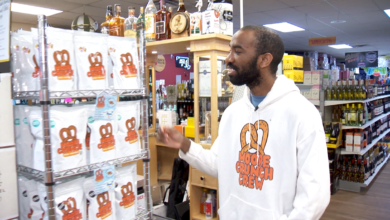Buyrentkenya founder tips on riding entrepreneurship cycle

Nothing gets Jamie Pujara excited like the challenge of a new business. Unlike the typical entrepreneur who establishes a startup and shepherds it along the various business growth stages, Jamie prides himself in knowing when to exit at the zenith.
He did it at Buyrentkenya.com, a firm he had co-founded and built into arguably the number one property portal in Kenya, shocking many observers.
Reflecting on his entrepreneurial journey, Jamie says understanding the cyclical nature of entrepreneurship is crucial for anyone going into business.
Successful fundraising
After two successful rounds of fundraising for Buyrentkenya.com in 2017, he and his partner decided it was the opportune moment to exit. The idea was to return their focus to the family’s business, the Tin Tin Restaurant, one of the oldest having been established in 1978 at the Kenyatta International Convention Centre.
“Upon my departure from Buyrentkenya.com, our restaurant business adopted a new strategy focused on addressing the need for affordable lunch options. We launched smaller cafeterias in strategic locations across Nairobi to fulfil this need,” he elaborates.
Jamie notes the rapid expansion of Kenya’s hospitality sector in recent years, bringing both opportunities and heightened competition.
To stand out, businesses must innovate in delivery methods and consumer engagement, leveraging people’s passion for food.
“Competition is important because it forces people to be creative and innovative. The Kenyan middle class doesn’t grow as fast as the new restaurants and eateries that are being opened,” he says.
Amid these changes, Jamie’s plan to cater to the working class through lunchtime offerings faced an unexpected hurdle with the onset of the Covid-19 pandemic.
Exploring new opportunities
Forced to reassess, he closed the cafeterias and began exploring new opportunities.
Drawing on his experience with Buyrentkenya.com, Jamie identified a gap in the market.
While at Buyrentkenya.com, he remembered looking at data and understood that there was a gap in the supply and demand for low to middle-income housing.
“We looked at the data on the areas that are up and coming and Riruta was on my radar and with Buyrentkenya.com gone, I thought of getting into property development which is about aspirational living,” recalls Jamie.
Aspire Heights, his latest startup is on course to deliver a 65-unit apartment complex in Riruta.
Lessons along the way
Reflecting on his entrepreneurial journey, Jamie says in entrepreneurship, there is always an element of luck and that at the beginning of his journey, it was a case of being at the right place at the right time and knowing what he knows now, he would have done somethings differently.
The serial entrepreneur emphasises the importance of clarity of vision and investing in teams.
“One of the most important things in business is clarity of vision – why are you in your line of business, what are you trying to achieve? At Buyrentkenya.com, it was to fix a problem but there was no clarity on how far I wanted to take it,” he expounds.
“Your vision and mission have to be clear on what are you trying to achieve and your values should play into company culture in terms of having employees buying into and that should crystalise clearly,” he emphasises.
Learning from mistakes
He advocates for empowering employees to make decisions and learn from mistakes. He learned the import of this the hard way when in the early days he had a tendency of do everything on his own.
“Allow them to make decisions and make mistakes, that’s how I prefer to operate,” adds Jamie.
Furthermore, Jamie underscores the value of maintaining a beginner’s mindset, emphasising the importance of adaptability and seizing opportunities.
“I learned this when I came back from New York. If you think you know everything then it is very difficult to find opportunities and see the solutions. If you overanalyse then you’ll find a reason not to do something,” he explains.
Cash flow unpredictability
Despite the successes, Jamie acknowledges the challenges of entrepreneurship, particularly cash flow unpredictability and access to capital.
“Unpredictable cash flow is probably the hardest one to juggle because it makes it a lot more difficult to plan in terms of investments and decision-making,” he says.
Jamie observes that access to capital is probably the hardest thing for new entrepreneurs, but at Buyrentkenya.com, they were lucky to have international investors who came in even though it was more difficult to articulate the opportunities than compared to now.
“At Buyrentkenya.com, we realised we had a lot to learn and had to attend lots of workshops and seminars, explain the opportunities in Kenya for people to understand our drive and ambition,” recalls Jamie.
He adds that even though they were quite comfortable and not planning to raise funds at that time as they had become the number one property portal in Kenya, they had to seek funding when a deep-pocketed player entered the market.
Storytelling importance
He highlights the importance of storytelling in securing investment and advises entrepreneurs to remain agile in the face of change.
“It is about telling the story and selling the opportunity and investors having the confidence in your ability as an entrepreneur to be able to execute,” he advises.
“Because of our position [at Buyrentkenya.com] , attending conferences and learning from industry leaders in other countries, we became noticed and when we went looking for finances, it was easier to do so,” he explains.
Navigating family business
Navigating family businesses presents unique challenges, with emotional dynamics often complicating governance structures.
However, Jamie stresses the importance of maintaining clear roles and responsibilities by employing corporate governance, noting that the most successful companies are those that have been able to transition from pure family into corporate entities.
“In family businesses, family members tend to have a lot of power and influence and that can blur lines of responsibilities of directors, Heads of Departments s and managers,” says Jamie.
In addition to his entrepreneurial endeavours, Jamie is actively involved in the Entrepreneurs Organization (EO), a global peer-to-peer network for entrepreneurs.
Serving on EO’s global board of directors, Jamie says he values the opportunity for entrepreneurial learning and growth within the organisation.



